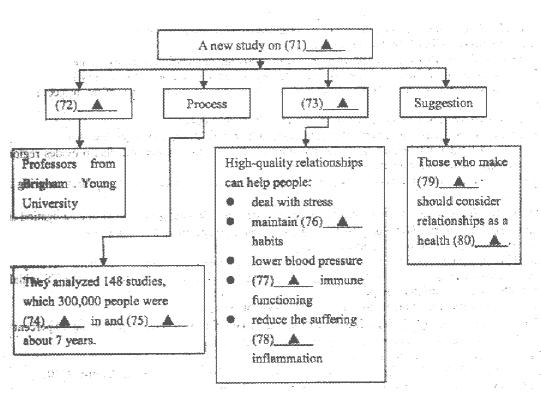请认真阅读下列短文,并根据所读内容在文章后表格中的空格里填入一个最恰当的单词。
注意:每个空格只填1个单词。请将答案写在答题卡上相应题号的横线上。
A newly-established line of research suggests that relationships can keep us healthier. And a new study finds those social connections may also help us live longer.
This new study combined a large number of previous studies and concluded that a lack of social interactions ranks right  up with smoking, obesity(肥胖), and alcoholism as a risk factor for death.
up with smoking, obesity(肥胖), and alcoholism as a risk factor for death.
Researchers from Brigham Young University analyzed 148 studies with a total of some 300,000 participants, tracking their social relationships and whether they survived to the end of their particular study, which averaged about seven years.
"Those who scored higher on those measures of social relationships were 50 percent more likely to be alive at that follow-up than people who scored low on those measures," said Professor Julianne Holt-Lunstad, one of the authors of the study.
She pointed out several ways relationships c an affect our health. They can help us cope
an affect our health. They can help us cope  with stress. They can help us maintain healthy habits like eating well, exercising or seeing a doctor. And there's increasing research that shows a direct bu
with stress. They can help us maintain healthy habits like eating well, exercising or seeing a doctor. And there's increasing research that shows a direct bu t poorly-understood link between relationships and physiological(生理的) processes in the body.
t poorly-understood link between relationships and physiological(生理的) processes in the body.
"So for instance, our relationships have been linked to lower blood pressure, better immune(免疫的) functioning, and even inflammatory(发炎的) processes that are implicated in a number of diseases," said Holt-Lunstad. "And so our relationships can influence our health in a variety of ways that are all very important."
Even though Holt-Lunstad and her colleagues looked at almost 150 different scientific studies, most of them didn't assess the quality of the relationships.
"And certainly relationship quality matters, and not all relationships are entirely positive," she conceded. "And so it's possible that the effects that we have reported may be a conservative estimate, and that the odds of survival associated with high-quality relationships may actually be larger."
Speaking via Skype, Julianne Holt-Lunstad said her research suggests that policy makers need to consider relationships as a health issue. So just as no-smoking zones have expanded over the years, she suggests that city planners, for example, should consider whether their decisions might promote or hinder the development of personal relationships.
71.reatopmsjo[s 72.Researchers 73.Conclusion(s)/Reault(s)
74.involved 75.nvemged/lasted 76.healthy
77.improve/better 78.from 79.policies 80.issue
